

 |
 |
||||
| Home | Reviews | Extras | Forums |
|
Tonari no Yokai-sanSynopsisAs a house cat living to the ripe ol' age of 20, Buchio is reborn into a nekomata, a cat creature in Japanese folklore. While this isn't entirely unusual in a world where the supernatural live and work alongside humans, it is still a cause for celebration as their old family member is about to embark on a whole new life. ReviewTonari no Yokai-san is a bit of a modernist take on folklore, and it's also hardly the first one I've ever seen. It's still a somewhat unique take, though, as unlike earlier shows I've seen that has dipped toes or even entire foots into the waters of the supernatural, this show stands as the one that has normalized the prescence of the supernatural the most. The two other shows that comes to mind the quickest is Natsume's Book of Friends and GeGeGe no Kitaro, both of which are shows where the yokai aren't necessarily good or evil by default, but rather turned out that way through circumstance. It's a bit of an improvement on the little I read about Nekomata prior to this review, where nekomata are pretty much all evil, potentially vengeful spirits depending on a few factors, chiefly how they were treated as cats, which isn't entirely unlike my own culture where the trolls, huldu people or other supernatural creatures were to be avoided at all costs or, at best, placated through offerings. 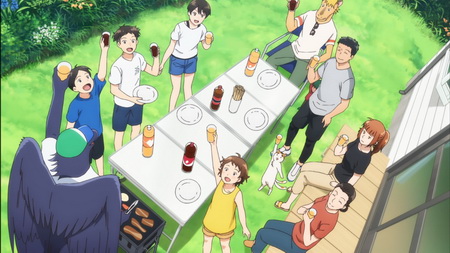 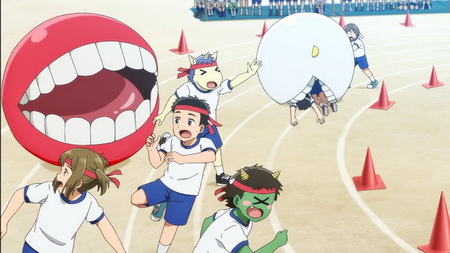 With that in mind, I want you all to realize one thing. 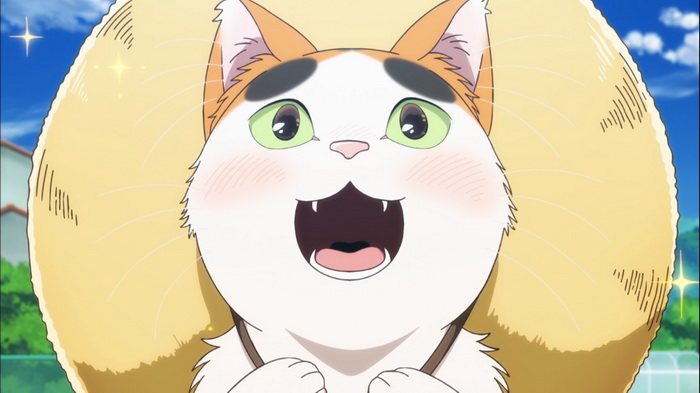 Buchio is ridiculously adorable. He might very well be one of the best boys ever. As a kitten, he was saved from a kite (as in the bird) by the Ōishi family and pretty much adopted as the family pet, and once his tail split up into two, he also became the latest addition to a rich yokai culture living among the humans in Fuchigamori. He's a very sensitive and shy boy; the first time we meet him, he had already hidden himself into a paper bag, and even after that he remains an overly polite, soft-spoken young cat. Amusingly, one of his first acts as a nekomata now living under modern society is... paperwork for days. Beyond that, he sets out to learn about his newfound powers and how to best repay the family that took him in. I can only imagine that, as a normal cat, he was the kind who approached you with some caution, but as soon as he trusted you, you'd get all his attention in all the best kitty ways. In my two aforementioned comparison shows, yokai were either completely invisible to humans, or they mostly chose to stay hidden from them. Mixing in some slice-of-life aesthetics, Tonari no Yokai-san has instead chosen to integrate the yokai into its society in a way that makes its populace literally teeming with supernatural life. Jiro-san is an equally prominent member of the cast; a crow tengu tasked with protecting the city and the valley it resides in. He lives together with Tazenboy Fuchibiyama, another tengu, and one who looks a bit more like I would imagine most non-Japanese people would expect. There's also Tachibana Yuri, a local kitsune who becomes Buchio's teacher in the art of transformation, and who also harbors some grudges towards her family. Even beyond that, you have about half the cast be yokai, so expect to see some colorful people among all the characters. The most obvious one would be the ones who are either talking animals or have animal characteristics. You have Rain, who is a half-kappa girl. Like regular kappa, she seems to have that pool of water on top of her head, but covered by some kind of protective cap. (I think?) Presumably to keep it from spilling, which would be very dangerous for her. Due to said cap, I genuinely thought she might've been Jewish, though, and it was her green, web-fingered hands that eventually clued me in on her species. There's also Betobeto-san, a very tiny yokai who was reborn from the shadow he used to be. Differing slightly from the mythological origin, his form was originally represented as a black void of loneliness. Also, taking the concept of tsukumogami -- personal items, mainly tools, who gain life through the aquisition of a spirit -- one step further, we have Nishiya Chiaki. Serving as the car of a widowed man, Nishiya Kazuhiko, he had gained his spirit -- and name, evidently -- when Kazuhiko was still living with his wife. Even before we knew his circumstances, I had questions, because when Chiaki isn't in his car form, he takes the form of a man with a car for a head, and it is ridiculously glorious. Being of Volkswagen make (a Golf, specifically, and he even has the same color -- a bright yellow -- as the 50 year old model you'll see if you google it), he is often affectionally referred to as "Wagen-kun" by his friends and aquaintances, and I imagine his awakening was something people had to get used to in a way they hadn't before. ("Self-driving car?!") 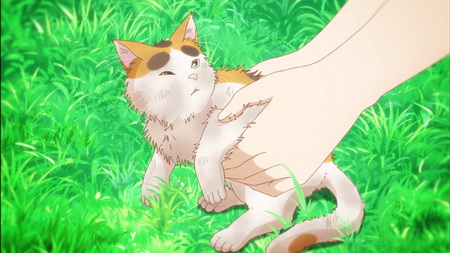 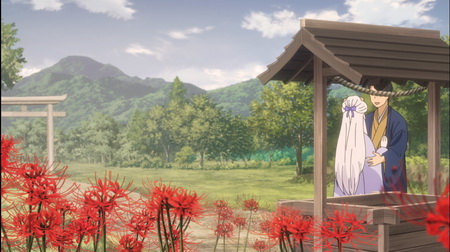  It's a curious thing, because unlike any other shows I've watched that involves yokai in some form or another, Tonari no Yokai-san's world of gods, demons and spirits live entirely alongside human beings. Other shows have flirted with this concept before, but not even close to this level. Everywhere you go in Tonari no Yokai-san, you'll see a population that's about 50/50 humans and clearly not humans, and that's not taking into account that people who look human might not actually be one. This isn't necessarily meant to be an ominous or villainous thing; Yuri, for instance, spends most of her time in her human form despite being a kitsune, but her being one isn't really a secret for anyone in town who knows her. Yuri is a curt and sometimes snappy person, which it turns out is entirely based around family matters; a source of pride that got its core completely shaken up by a single comment from one of her family friends. And just when you think the story is rich enough through all its yokai lore, it starts bringing in alternate dimensions into the fold. A few episodes in, there is a crack in the sky above, and from there, we start learning about alternate dimensions. The earliest episode involves a scene when two Yuris swap worlds, and while it is hilarious to see the "other" Yuri (who is a normal human coming from a dimension where yokai either doesn't exist or remain hidden from humans), the moment itself is treated with all the gravitas of what would otherwise be a complete mystery. And this is when the Space Time Laboratory gets involved, because we have that too here. It is in its infancy judging by the top secret nature of much of what they do, but as the show goes along, it fills in whatever spaces is left that general living and the spirit world can't cover. It feels a little weird to watch a show that almost literally has everything to bring to bear on a moment's notice, and people are probably going to be a bit split on how it all comes to an end. No spoilers, of course, but Tonari no Yokai-san gets downright 2001: A Space Odyssey levels of metaphysical weird on our asses before it comes to an end. The manga has ended, rounding off at four volumes (and a side story, whatever that means), so this anime might actually cover all there is. It's hard to say unless the manga gets a chance to shine in English as well. In addition to half the cast being yokai, Tonari no Yokai-san's cast is also made up of lots and lots of children. Chiefly among them is Sugimoto Mutsumi. In addition to training to become a Miko, she's also dealing with the disappearance of her father as well as her own burgeoning feelings for Jiro. While the show doesn't give any indication of whether Jiro, a near immortal crow tengu, is going to enter into a relationship with whom is basically a human child, the show still doesn't really belittle her feelings. She might come across as a little too precocious at times, but Tonari no Yokai-san still does an excellent job at portraying her, as well as all the other children, as just that. They're all good kids too, which is not to say they don't make mistakes or hurt their fellow kids, but they are allowed to dwell on their mistakes and make up for them later on. Mutsumi's position is a little harder, though, because the target of her crush does have a job that is going to put him in danger, no matter how much she might wish otherwise. Although Jiro's role as a guardian has made him a bit too careless and prone to make sacrifices for the benefit of others, so it's not like Mutsumi doesn't have a point either. 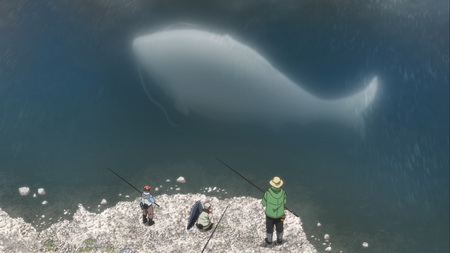 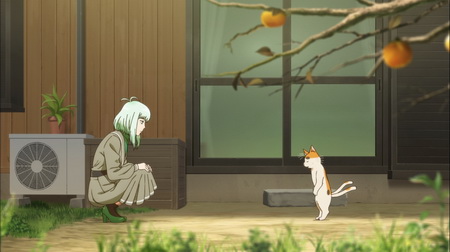 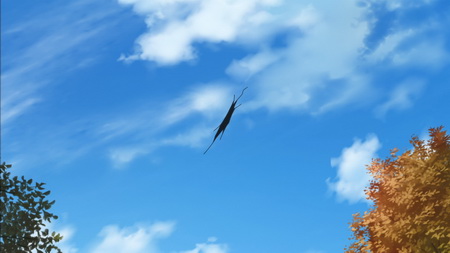 Despite the show's audacity of throwing its net so wide, I can't help but feel satisfied with my time with Tonari no Yokai-san. It's not the first show to mix spiritual/supernatural beings with science, as I can still remember Interview With Monster Girls's little lesson when Takahashi-sensei brought Kyouko to one of his friends and had a long conversation about how Kyoko's neck breaks the space/time continuum by way of a wormhole or something akin to that. Tonari no Yokai-san does a nice job melding the two worlds of science and spiritualism, and while I felt it pushed its luck a liiiittle bit near the end, I'm glad I took the time out of my short human life to watch it. A lovely little spiritual/scientific mishmash with the bestest boy of all. — Stig Høgset Recommended Audience: The show doesn't shy away from some of the darker aspects of life, spiritual or otherwise, and there's also the event that happens near the end of the show. Version(s) Viewed: Digital stream on Crunchyroll, Japanese with English subs. Review Status: Full (13/13) Tonari no Yokai-san © 2024 Liden Films. |
 |
|
| © 1996-2015 THEM Anime Reviews. All rights reserved. |